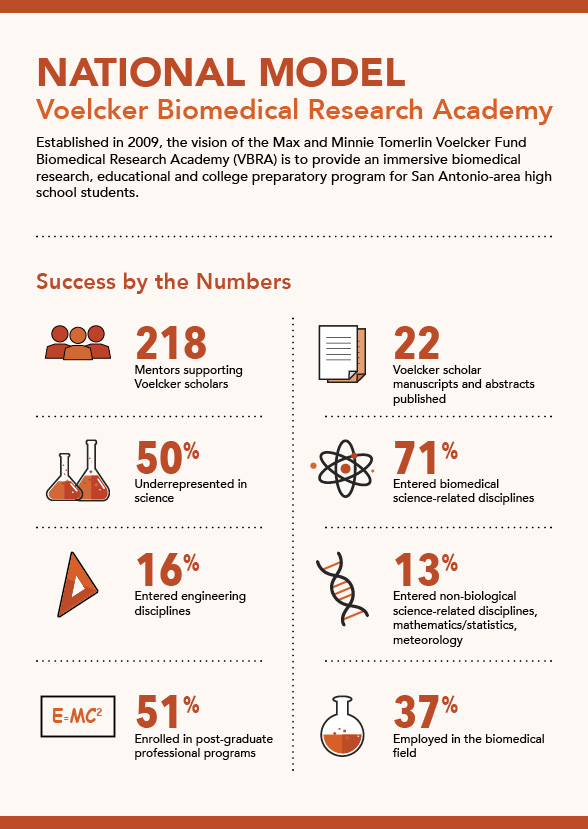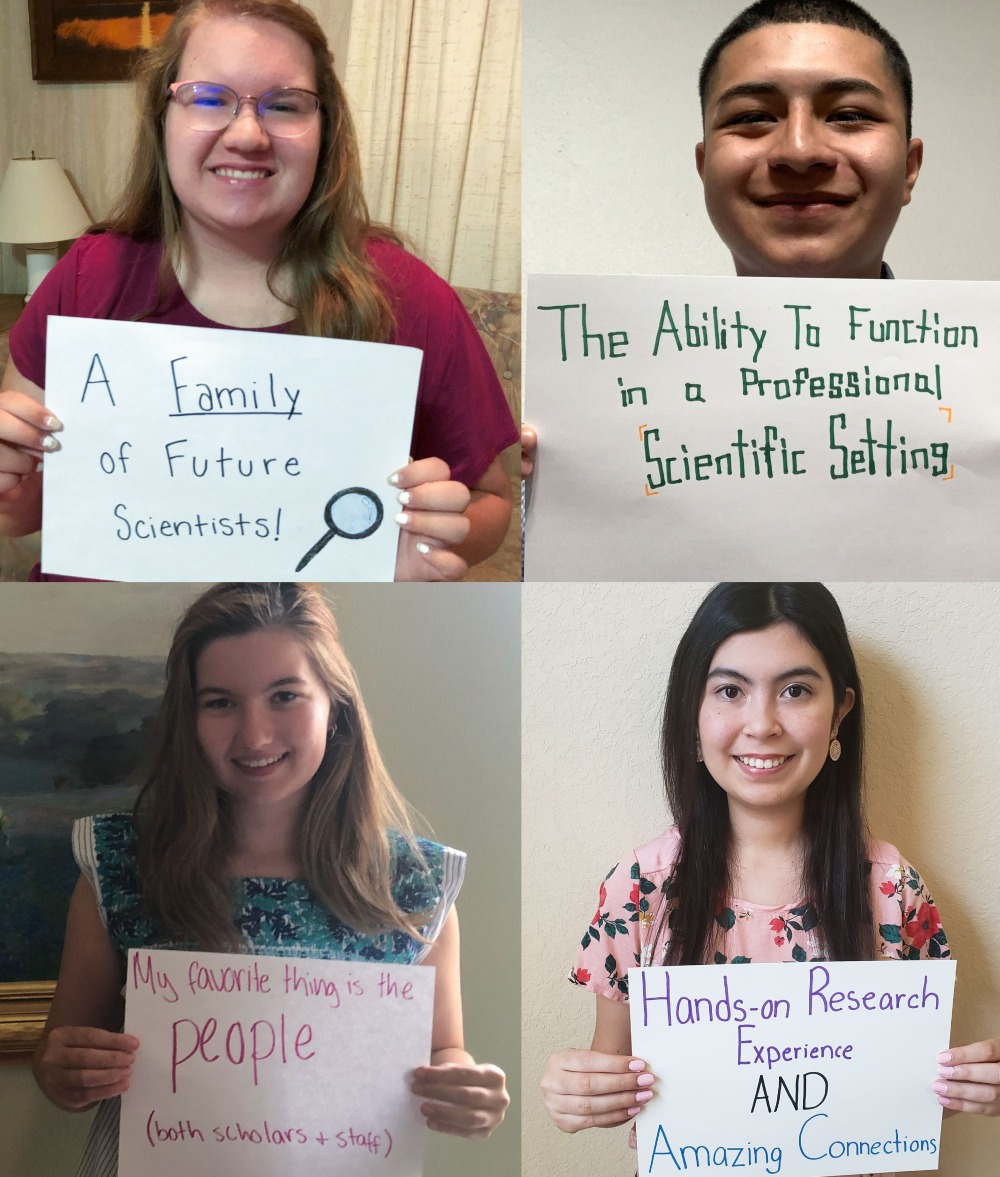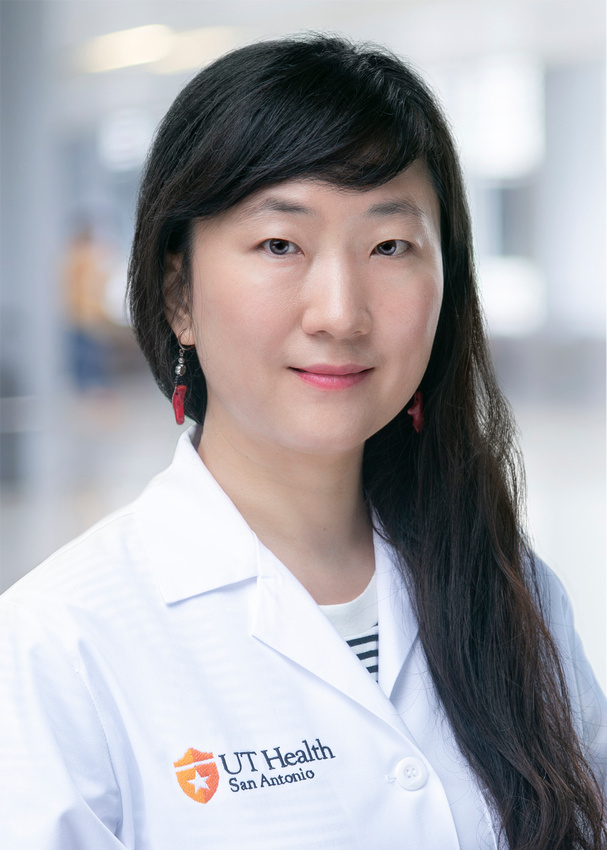
Since 2009, the Voelcker Biomedical Research Academy (VBRA) has prepared high school students (VBRA scholars) for future career options in biomedical sciences. Establishing pipeline programs in science, technology, engineering, and math (STEM) is critical to meet the expanding demand for a well-trained workforce in these fields and to increase the competitiveness of our nation in the global economy.
Nevertheless, nationwide concerns continue regarding high attrition rates and the low number of underrepresented students in STEM disciplines. Thus, programs aimed at increasing the number of STEM students completing advanced degrees must consider appropriate tools to support individuals from socio-economically disadvantaged backgrounds.
The VBRA provides exceptional opportunities to high school students from the San Antonio area to engage in hands-on research activities with an established investigator at UT Health San Antonio. Following the guidance of its leadership team and encouraged by the Voelcker Trustees, the VBRA has recently expanded its curriculum to include principles of personalized medicine, data science, and technology commercialization, as well as new programmatic activities to engage with underrepresented students more productively.
Due to the onset of COVID-19 and the related safety concerns, the VBRA program for the summer of 2020 was significantly modified: no new high school students were enrolled, and virtual activities were offered to existing scholars to complete their research projects by engaging with lab researchers and using online lab kits. In addition, the VBRA program leveraged these unprecedented circumstances to upgrade its website, create virtual recruitment materials, and provide a virtual curriculum that focused on college and scholarship applications and leadership development.
Voelcker Academy alumna, Selina Noe, who recently completed her sophomore year as a global health major on the pre-med track at Trinity University, enthusiastically recalls her experience. Watch the video.
The lessons learned during the pandemic have been incorporated into new virtual didactic and enrichment activities that will continue in the coming years. The ultimate goal is to develop the VBRA as a national model that provides high school students with the scientific literacy and professional skills needed to foster further academic achievements and future success in biomedical science careers.

Welcome, Voelcker scholars!
On June 15, a new cohort of 23 sophomores (VBRA scholars) who were selected through a highly competitive process will start their research training on our campus.
Working closely with their teachers, all interested students received guidance on the application process and refined their interview skills through mock practice sessions. The VBRA program also facilitated interviews for those applicants who did not have internet access.
These targeted efforts resulted in the selection of a diverse population of scholars from schools that had previously not been represented in the VBRA, including Boerne and Wagner high schools, as well as Great Hearts Northern Oaks and Great Hearts Monte Vista charter schools.
Voelcker Academy pivots in a fresh, new way while enhancing its stellar reputation
An important feature of the VBRA programmatic structure is the participation of a tier of mentors and instructors, from junior faculty to post-doctoral, graduate and MD/PhD students. All mentors are encouraged to attend the Entering Mentoring workshop series offered by the Office of Postdoctoral Affairs, which provides strategies for effective and culturally competent mentoring relationships.
In subsequent years, the curriculum will include opportunities for VBRA scholars to learn from Years 2 and 3 VBRA students about the UT Health San Antonio environment, expectations and personal experiences. The relationship with these peer mentors significantly impacts the VBRA program by exposing all levels of VBRA scholars to teaching and tutoring experiences as well as developing their social and networking skills.
Mentor and mentee value the mutual learning relationship 
Hye Young Lee, PhD, a Voelcker Academy mentor, explains what sold her on including VBRA scholars in her research program. "At first, I didn't have any intention of taking on high school students in my lab," Dr. Lee said. "But shortly after I declined the invitation, I attended a conference at UC Berkeley, whose keynote speaker spoke about the ‘sparkle’ of inspiration he receives from the high school students he mentors as part of his lab’s program.”
Upon her return to campus, Dr. Lee contacted Irene Chapa, PhD, director of the VBRA program, and ardently agreed to mentor high school students based on what she heard at the conference.
VBRA alumnus, Peter Mason, credits Dr. Lee and her research team for the invaluable guidance and opportunity that equipped him to successfully complete his freshman year at The University of Texas at Austin last month.
“Putting in more hours than expected is probably the most important thing I learned from my experience in her lab, Mason said. “Dr. Lee worked countless hours to achieve her goals, and I know I can do the same.”
While he noted several learning outcomes, Mason singled out his co-authorship with Dr. Lee on a scientific article on a mouse model of fragile X syndrome and other publications as his proudest achievement.
Paying it forward
VBRA alumna, Adriana Avendano, today is a senior at The University of Texas at San Antonio pursuing her degree in biomedical engineering. She wanted to remain engaged with the VBRA program, and her passion for education made her a natural fit to work as the program’s academic coordinator.
She shared how being matched with her mentors in the cardiovascular optics lab brought her to the realization that she wanted to pursue a career in biomedical engineering. “I knew I was exactly where I needed to be and that I could make a difference,” Avendano said. “After the program, I became a college mentor and now work full time for the VBRA. As I continue to pursue my bachelor’s degree and eventually earn my master’s and doctorate degrees, I hope to one day become a mentor to a Voelcker scholar in my own lab at UT Health San Antonio.”
About the Voelcker Fund
Named for San Antonio benefactors Max and Minnie Voelcker, who were committed to growing biomedical research in the city, the Voelcker Fund has provided $3.2 million over 12 years to support the VBRA pipeline program.
The outstanding research training provided by the VBRA is unparalleled in the United States. All measures of scholastic achievement indicate exceptional programmatic excellence and outcomes of VBRA graduates. The VBRA clearly showcases the key role played by long-term, supportive pipeline programs to educate and diversify the next generation of biomedical professionals.
For more information on the Voelcker Biomedical Research Academy and the Voelcker Fund, please visit https://voelckeracademy.uthscsa.edu/.